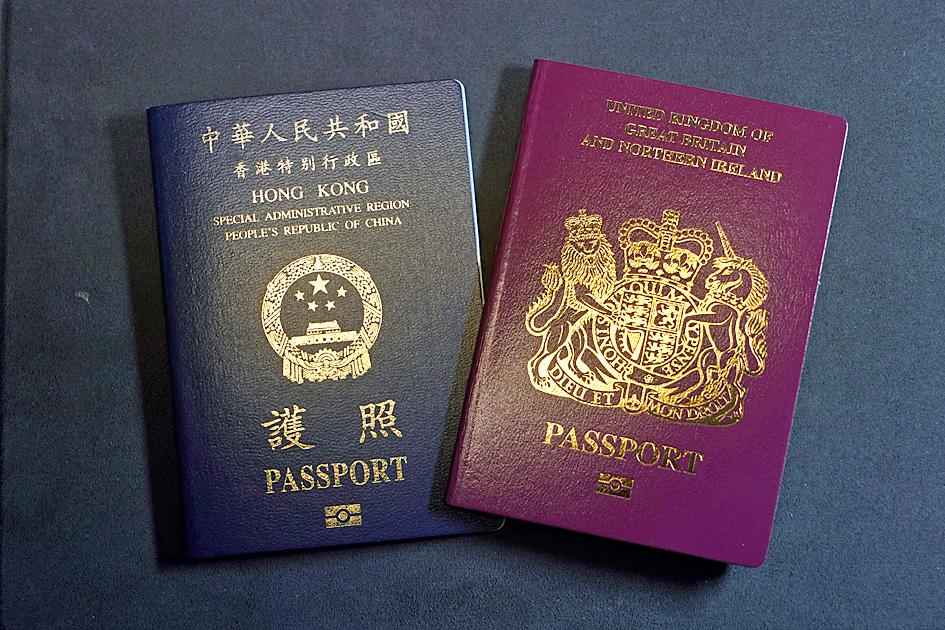The UK yesterday vowed to stand by Hong Kongers against a Chinese crackdown as it prepared to launch a new visa scheme, while Beijing later said that it would no longer recognize British National (Overseas), or BN(O), passports.
Holders of the passports — a legacy of UK rule over Hong Kong up to 1997 — would from tomorrow be eligible to apply to live and work in the UK for up to five years, and eventually seek citizenship.
Before the change, passport holders have had only limited rights to visit the UK for up to six months, and not to work or settle.

Photo: AP
The UK said that it is acting in response to the National Security Law that Beijing last year imposed on Hong Kong, which has devastated the territory’s democracy movement and shredded freedoms meant to last for 50 years under the 1997 handover accord.
“I am immensely proud that we have brought in this new route for Hong Kong BN(O)s to live, work and make their home in our country,” British Prime Minister Boris Johnson said in a statement. “In doing so we have honored our profound ties of history and friendship with the people of Hong Kong, and we have stood up for freedom and autonomy — values both the UK and Hong Kong hold dear.”
Any Hong Kong resident born before 1997 is eligible for BN(O) status. The new visa path opens up entry to the UK to an estimated 2.9 million adults in Hong Kong and 2.3 million of their dependants.
In practice, London projects that up to 322,400 of Hong Kong’s 7.5 million people would take up the visa over five years.
“We have been clear we won’t look the other way when it comes to Hong Kong. We will live up to our historic responsibility to its people,” British Secretary of State for Foreign, Commonwealth and Development Affairs Dominic Raab said. “China’s imposition of the National Security Law in Hong Kong constitutes a clear and serious breach of the [pre-handover] Sino-British Joint Declaration contrary to international law.”
In Beijing, Chinese Ministry of Foreign Affairs spokesman Zhao Lijian (趙立堅) said that “the British side’s attempt to turn a large number of Hong Kong people into second-class British citizens has completely changed the nature of the two sides’ original understanding of BN(O).”
“This move seriously infringes on China’s sovereignty, grossly interferes in Hong Kong affairs and China’s internal affairs, and seriously violates international law and the basic norms of international relations,” he told reporters at a daily briefing. “China will no longer recognize the so-called BN(O) passport as a travel document and proof of identity starting from Jan. 31st, and reserves the right to take further measures.”

Taiwan is projected to lose a working-age population of about 6.67 million people in two waves of retirement in the coming years, as the nation confronts accelerating demographic decline and a shortage of younger workers to take their place, the Ministry of the Interior said. Taiwan experienced its largest baby boom between 1958 and 1966, when the population grew by 3.78 million, followed by a second surge of 2.89 million between 1976 and 1982, ministry data showed. In 2023, the first of those baby boom generations — those born in the late 1950s and early 1960s — began to enter retirement, triggering

ECONOMIC BOOST: Should the more than 23 million people eligible for the NT$10,000 handouts spend them the same way as in 2023, GDP could rise 0.5 percent, an official said Universal cash handouts of NT$10,000 (US$330) are to be disbursed late next month at the earliest — including to permanent residents and foreign residents married to Taiwanese — pending legislative approval, the Ministry of Finance said yesterday. The Executive Yuan yesterday approved the Special Act for Strengthening Economic, Social and National Security Resilience in Response to International Circumstances (因應國際情勢強化經濟社會及民生國安韌性特別條例). The NT$550 billion special budget includes NT$236 billion for the cash handouts, plus an additional NT$20 billion set aside as reserve funds, expected to be used to support industries. Handouts might begin one month after the bill is promulgated and would be completed within

The National Development Council (NDC) yesterday unveiled details of new regulations that ease restrictions on foreigners working or living in Taiwan, as part of a bid to attract skilled workers from abroad. The regulations, which could go into effect in the first quarter of next year, stem from amendments to the Act for the Recruitment and Employment of Foreign Professionals (外國專業人才延攬及僱用法) passed by lawmakers on Aug. 29. Students categorized as “overseas compatriots” would be allowed to stay and work in Taiwan in the two years after their graduation without obtaining additional permits, doing away with the evaluation process that is currently required,

RELEASED: Ko emerged from a courthouse before about 700 supporters, describing his year in custody as a period of ‘suffering’ and vowed to ‘not surrender’ Former Taiwan People’s Party (TPP) chairman Ko Wen-je (柯文哲) was released on NT$70 million (US$2.29 million) bail yesterday, bringing an end to his year-long incommunicado detention as he awaits trial on corruption charges. Under the conditions set by the Taipei District Court on Friday, Ko must remain at a registered address, wear a GPS-enabled ankle monitor and is prohibited from leaving the country. He is also barred from contacting codefendants or witnesses. After Ko’s wife, Peggy Chen (陳佩琪), posted bail, Ko was transported from the Taipei Detention Center to the Taipei District Court at 12:20pm, where he was fitted with the tracking